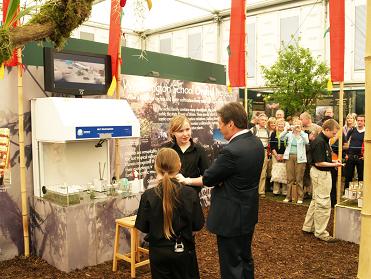Channels
Special Offers & Promotions
Orchid propagation techniques for conservation and education undertaken using Bigneat laminar flow cabinets
 The Writhlington School Orchid Project has involved hundreds of students in the twenty or more years that it has been running. Led from the start by teacher Simon Pugh-Jones, the project grew out of the after-school Gardening Club for students, making use of a set of old greenhouses on the school property. After a collection of orchids was donated to the club, Simon was able to instill his students with his own schoolboy passion for this diverse and fascinating group of plants. Exhibiting and selling plants at horticultural and local shows, the club started to specialise in growing orchids and around ten years ago, they took the next step in orchid propagation, growing from seed.
The Writhlington School Orchid Project has involved hundreds of students in the twenty or more years that it has been running. Led from the start by teacher Simon Pugh-Jones, the project grew out of the after-school Gardening Club for students, making use of a set of old greenhouses on the school property. After a collection of orchids was donated to the club, Simon was able to instill his students with his own schoolboy passion for this diverse and fascinating group of plants. Exhibiting and selling plants at horticultural and local shows, the club started to specialise in growing orchids and around ten years ago, they took the next step in orchid propagation, growing from seed.
The need for a laminar flow sterile air cabinet
In the wild, orchid seeds rely on a fungal partner to be present in order for them to germinate. In cultivation, identifying and inoculating seed with the correct fungus is extremely difficult, especially in normal greenhouse conditions, and so in vitro techniques are used. By sowing orchid seeds in sterile air provided within a laminar flow hood, on a sterilised nutrient agar medium which supplies the seeds with the sugars, minerals, and other nutrients they need, it is possible to generate vast quantities of healthy orchid seedlings from a single seed pod (a single pod can contain hundreds of thousands, to several million, minute dust-like seeds).
The ‘mother flasks’ of seeds are placed in the school’s growth room, under rows of fluorescent lighting tubes. Once the seeds have germinated and developed into small round bodies (protocorms), they can be plated out onto fresh medium. As the seedlings grow and require more space and fresh nutrients, they are ‘reflasked’ into new jars of media, and replaced under the lights
in the growth room in between transfers. Once large enough, the seedlings can be taken out of their sterile jars and media, the sugar rich agar washed off the roots, and potted up to be grown on.
Choice of laminar flow cabinet
Several distributors and manufacturers of laminar flow cabinets were approached by Writhlington School as possible suppliers. Bigneat was selected, their cabinet being purchased through leading laboratory distributor, Scientific & Chemical Supplies. The main reason for this choice of cabinet supplier was based on the willingness of manufacturer Bigneat to work with and support
Writhlington School and other associates such as Botanic Gardens Conservation International in their work. Simon Pugh-Jones commented “We really think all schools should be working in clean air and teaching aseptic techniques so that students are prepared with skills which will be of use in a range of future careers in biological fields such as medical, chemical and life sciences, across to physics subjects such as microelectronics and nanotechnology.” He added “We believe that all schools should have a laminar flow cabinet and through teaming up with organisations around the world and working with Royal Botanic Gardens in Kew we hope to pass on the benefit of our experience and knowledge”.
Laminar Flow Cabinets from Bigneat
BIGNEAT laminar flow cabinets are designed to provide a high degree of protection for process or experimental apparatus in a laboratory. Many critical applications in the biological, medical, pharmaceutical, scientific and electronics fields demand an ultra-clean work environment which is free from biological and particulate contamination. The fan which draws air though HEPA filters (BS EN1822 H14 grade) is designed to provide ultra-quiet operation and low vibration level. These cabinets are suitable for direct location onto the laboratory bench or alternatively, mounted on a support frame or cupboard. Cabinets can be supplied with a variety of optional accessories including germicidal UV lamps.
For more details about School Orchid Propagation for Community Conservation, Enterprise and Education please contact Simon Pugh-Jones or visit: http://wsbeorchids.org.uk
For more details regarding laminar flow cabinets please contact Bigneat Ltd, Waterlooville or visit
www.bigneat.com
Media Partners


